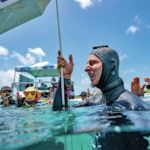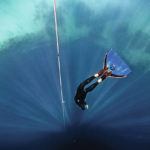KAILUA-KONA — Deep freediving can sound like a horror movie in the making.
Divers hold their breath for nearly three minutes with their body enduring several atmospheres of pressure, all the while diving into darkness with the possibility of a blackout coming at any moment due to one of a million things that could go wrong.
To someone unfamiliar with deep freediving, it may seem that holding a breath for so long would be the hardest part of the dive. However, this is not so, according to Kona’s Daniel Koval, who broke the men’s national freediving record in the discipline of constant weight last week.
“In my freediving beginners course, I can teach most people to hold their breath for up to three minutes,” said Koval, who teaches for Deep Freediving Instruction. “Equalization is the most difficult part. You have to be able to handle extreme depths.”
Koval set the new record at the Vertical Blue International competition, which is held in the Bahamas, by descending to a depth of 102 meters (335 feet) in a time of 2 minutes and 50 seconds.
While diving to the national record — toping Kailua-Kona’s Kurt Champers, who reached 101 meters in 2016 — Koval had to deal with 11 atmospheres of pressure, which produces roughly 162 pounds of pressure per square inch.
“Air is very important,” Koval said. “You need air to equalize. With your lungs compressing to the size of golf balls and acting like a vacuum, you need to be able to keep air inside your mouth to dive deep.”
Everything went right in Koval’s record dive, which came on his second attempt.
“My heart beat was as 70 beats a minute before the dive, which is quite normal, and I had gotten the nerves out of the way,” Koval said. “I started to go down and everything was going as planned.”
Koval said the water was murky on his dive attempt, and at 70 meters, there was nothing but darkness.
“It made me a little tense, but I was able to stay relaxed and I went down to 102 meters and I grabbed the tag at the bottom,” Koval said. “Heading up I started to kick really hard, (ascending) at probably one meter per second, maybe faster. It was a difficult dive, but I kept on kicking and before I knew it I was at the surface.”
During the dive, Koval had several flashbacks to his first attempt of the competition, which came two days beforehand and did not go well, resulting in a blackout.
“My heartbeat before that dive was 120 beats per minute, which probably led me to burning more oxygen,” Koval said. “I had mixed thoughts on the second dive as I was descending, but I was able to push through.”
Once reaching the surface and going through the required steps to make the dive official, Koval was finally able to relax and let what he just accomplished soak in.
“I couldn’t believe it,” Koval said. “I was in quite a shock for a while afterward.”
Koval attempted one more dive late in the competition, and reached 99 meters before turning around.
“I was getting tired but I was trying to break my own record by going to 103 meters,” he said. “It was still a good dive and I was having more fun.”
Koval started getting into freediving at an early age so he could spearfish off the coastal waters of California. From Orange County, Koval started spearfishing at the age of 12 and did not know much about deep freediving.
“I wanted to go out, explore the ocean and catch fish,” he said. “There were not really any freediving courses at the time so I took a few scuba classes to gain more knowledge.”
Most of Koval’s early freediving experience was picked up by trial and error. At the age of 19, the Californian picked up his belongings and moved to Oahu.
In Oahu, Koval was finally able to meet other freedivers, most notably Mark Stepanek, a world class freediver, who has held several records and was the first diver to reach a depth of 400 feet on a single breath of air.
Stepanek is also the founder of Freediving Instructors International, the largest freediving education agency in the United States, and Koval quickly became a student.
“I wanted to learn from this guy, so I started to take his courses and I realized how many things I was doing wrong,” Koval said. “I also learned how much I could improve.”
During his time on Oahu, Koval competed in several spearfishing competitions. As he began to do well in the competitions, his desire to go even deeper emerged.
Eventually this led Koval to the Big Island roughly three years ago, since the waters around the island go deeper than those around Oahu. His first deep dive competition was the Kona Paradise.
“It is just a small competition, with a lot of friends of people, and I was stressed and did not really know what I was doing,” Koval said. “Those people were going deeper than I was and so I started working really hard.”
The hard work paid off quickly, with Koval reaching 100 meters in July of last year, and he also managed to reach 100 meters easily in a training swim right before the Vertical Blue, setting the stage for his record breaking performance.
Koval also has no plans of slowing down anytime soon, and will continue to try to break his own record.
“I am in the water, diving six days a week with my partner, Kristin Kuba,“ Koval said. “We always dive together and she makes sure I am safe.”



